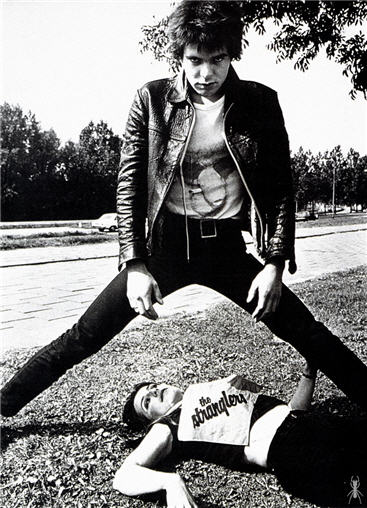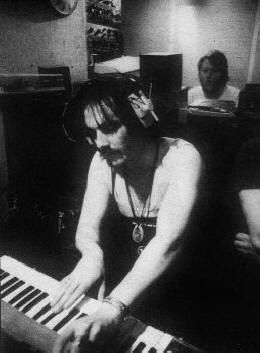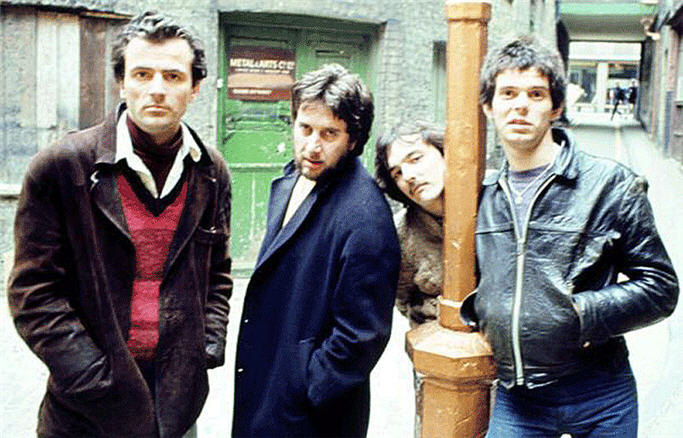TW STUDIOS
Alan Winstanley cut his studio teeth back in the 1970s at the
nascent TW Studios where he engineered Stranglers albums
alongside producer Martin Rushent who sadly passed away
recently.
‘I first met Martin in 1976 in TW Studios. At the time he was working
with Andrew Lauder in the A&R Dept at United Artists. I was the
in-house engineer at TW, and there was a band I’d been working
with who took their demo to Martin to try and get a record deal. He
liked it, but suggested they redo the bass part back in the studio.
So Martin came down, and that’s when he told me about a band
they’d just signed to UA called The Stranglers.’
It was Martin who suggested they use TW with Alan to record The
Stranglers’ debut album. Little did he know that Alan had already
worked with the band in the same studio.
‘Martin liked TW and said he’d like to record their debut album here.
Of course, I already knew the band as this was where I’d recorded
their early demos. He went back to The Stranglers and mentioned
this to them, and they said they’d love to go back to TW. So early
1977, we did the Grip single first of all and then Rattus, plus what
would end up as half of No More Heroes. After that, we did Black And White the following year.
We actually did quite a lot or work in a short period of time.’
Alan’s career in studio recording came about after frequenting a music shop on the corner of
Fulham Palace Road and Lillie Road as a schoolboy. It was set up by two musicians called Chris
Tompkinson and Gary Wilson in the mid 70s. Alan loved to get the guitars down to play, much to
the owners’ annoyance. After leaving school - Alan found it hard to break into music production
as all the big studios wanted certain qualifications - Decca Records had taken him on in A&R -
but studio work was burning away inside.
‘I found out that this music shop had a basement that was doing nothing, so I persuaded them
to set up a little 4-track studio in it and I ended up getting myself a job as engineer there. When
it got really successful, they bought a premises around the corner about two doors along,
updating it to 16-track, and that’s where The Stranglers recorded Rattus, in this tiny little studio.’
The Stranglers laid down their first three albums here – all top-sellers - spawning a string of
singles to help carve out their name in the late 70s British popular music culture and beyond.
‘It was a great little studio. It was small, but worked well for The Stranglers. It was really dead,
which is good in some ways because separation was quite good, there wasn’t too much trouble
with spill, or at least not too much. What spill there was sounded alright, really. But all the same,
I couldn’t wait to start working at bigger studios.’
It’s June 1979 when Martin opts out of producing The Stranglers’ fourth album The Raven, but
Alan steps in.
‘I’d just come back from holiday and got a message asking me to record The Stranglers in
Paris. This was my first proper album production job. Once we’d done that, we had to mix it
back in London, at Air Studios in Oxford Street. It was during this session when I got the phone
call from Clive Langer, who I’d worked with before, to say Stiff had just signed a band who had
played at Dave Robinson’s wedding, called Madness, and we were to produce their album.
Clive and I recorded some of that around September 79 at TW and some at Eden. Then I left
TW. I mean, after all those years stuck in a basement, I couldn’t wait to get out!’
With Alan gone, business at TW declined. The owners upped sticks to nearby Putney where
they thought a ditching the basement location would be better for business. Unfortunately, the
new set-up didn’t last long.
Meanwhile the old TW became a night club but noisy revellers invited complaints from
neighbouring houses. Once the license was revoked, the site of the former hub of independent
recording studios was left abandoned, mothballed behind a locked steel gate to this day. The
current owner resides in Portugal, according to the proprietor of the upstairs premises with no
immediate plans for the property.
Alan Winstanley cut his studio teeth back in the 1970s at the
nascent TW Studios where he engineered Stranglers albums
alongside producer Martin Rushent who sadly passed away
recently.
‘I first met Martin in 1976 in TW Studios. At the time he was working
with Andrew Lauder in the A&R Dept at United Artists. I was the
in-house engineer at TW, and there was a band I’d been working
with who took their demo to Martin to try and get a record deal. He
liked it, but suggested they redo the bass part back in the studio.
So Martin came down, and that’s when he told me about a band
they’d just signed to UA called The Stranglers.’
It was Martin who suggested they use TW with Alan to record The
Stranglers’ debut album. Little did he know that Alan had already
worked with the band in the same studio.
‘Martin liked TW and said he’d like to record their debut album here.
Of course, I already knew the band as this was where I’d recorded
their early demos. He went back to The Stranglers and mentioned
this to them, and they said they’d love to go back to TW. So early
1977, we did the Grip single first of all and then Rattus, plus what
would end up as half of No More Heroes. After that, we did Black And White the following year.
We actually did quite a lot or work in a short period of time.’
Alan’s career in studio recording came about after frequenting a music shop on the corner of
Fulham Palace Road and Lillie Road as a schoolboy. It was set up by two musicians called Chris
Tompkinson and Gary Wilson in the mid 70s. Alan loved to get the guitars down to play, much to
the owners’ annoyance. After leaving school - Alan found it hard to break into music production
as all the big studios wanted certain qualifications - Decca Records had taken him on in A&R -
but studio work was burning away inside.
‘I found out that this music shop had a basement that was doing nothing, so I persuaded them
to set up a little 4-track studio in it and I ended up getting myself a job as engineer there. When
it got really successful, they bought a premises around the corner about two doors along,
updating it to 16-track, and that’s where The Stranglers recorded Rattus, in this tiny little studio.’
The Stranglers laid down their first three albums here – all top-sellers - spawning a string of
singles to help carve out their name in the late 70s British popular music culture and beyond.
‘It was a great little studio. It was small, but worked well for The Stranglers. It was really dead,
which is good in some ways because separation was quite good, there wasn’t too much trouble
with spill, or at least not too much. What spill there was sounded alright, really. But all the same,
I couldn’t wait to start working at bigger studios.’
It’s June 1979 when Martin opts out of producing The Stranglers’ fourth album The Raven, but
Alan steps in.
‘I’d just come back from holiday and got a message asking me to record The Stranglers in
Paris. This was my first proper album production job. Once we’d done that, we had to mix it
back in London, at Air Studios in Oxford Street. It was during this session when I got the phone
call from Clive Langer, who I’d worked with before, to say Stiff had just signed a band who had
played at Dave Robinson’s wedding, called Madness, and we were to produce their album.
Clive and I recorded some of that around September 79 at TW and some at Eden. Then I left
TW. I mean, after all those years stuck in a basement, I couldn’t wait to get out!’
With Alan gone, business at TW declined. The owners upped sticks to nearby Putney where
they thought a ditching the basement location would be better for business. Unfortunately, the
new set-up didn’t last long.
Meanwhile the old TW became a night club but noisy revellers invited complaints from
neighbouring houses. Once the license was revoked, the site of the former hub of independent
recording studios was left abandoned, mothballed behind a locked steel gate to this day. The
current owner resides in Portugal, according to the proprietor of the upstairs premises with no
immediate plans for the property.
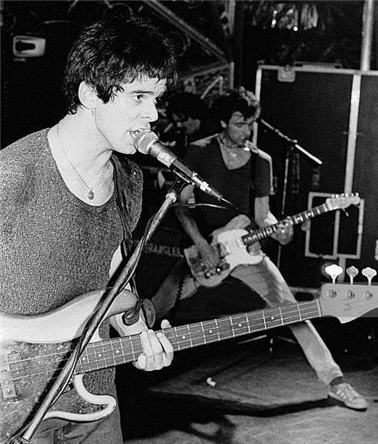
| Back in mid 1976, due to the persistance of Albion Management and their rapidly building reputation as a live band, The Stranglers became the focus of interest from the A&R departments of various record companies. At the forefront of the chase to sign the band was a young A&R man from UA records called Andrew Lauder, who had a keen ear for everything up and coming in music. |
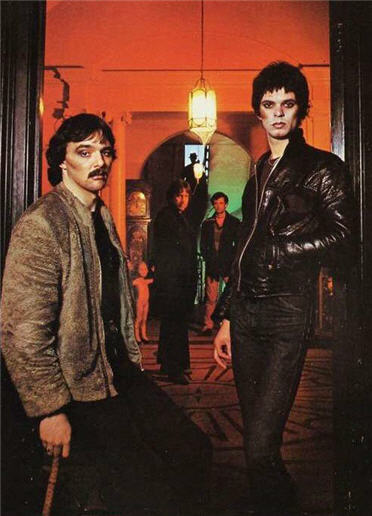
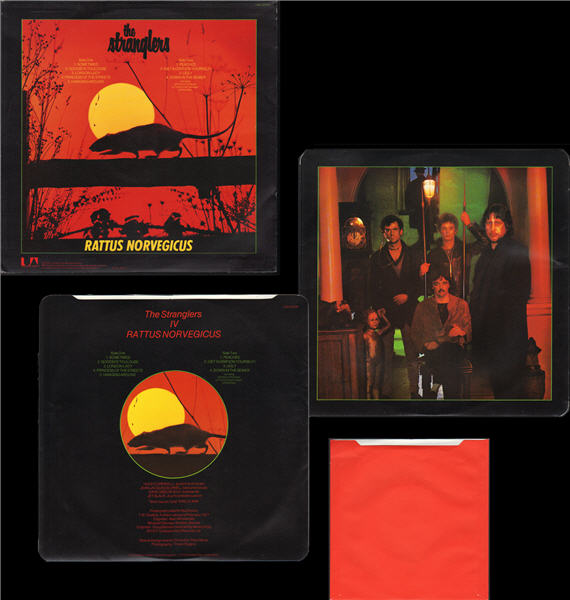
WOMEN ARE STRANGE WHEN YOU'RE A STRANGLER
THE STRANGLERS IV
Rattus Norvegicus (United Artists)
"About giving the woman some stick."
Thus begins the ecstatic review of this album (referring to the opener, "Sometimes") in Strangled, the apparently Stranglers-sanctioned
free fanzine of what seems to be The Stranglers Fan Club.
Evidently the niceties of the late '60s social humanism - women's lib, gay lib, and the respectful terminology that seemed such an essential
basis for their fragile advances (not calling women "peaches" of gays "faggots" like you don't call blacks "nignogs" unless you're wearing an
NF armband and have a crowd of thugs around
you) - all this seems to have gone by the board
with the emergence of a generation seemingly
devoid of self-respect and thus, by trite but true
extension, devoid of self-respect for others.
It is with this defiantly oafish and thoughtlessly
rebellious "attitude" that The Stranglers, visitors
from another generation which may have
wavered into complacency these past few years,
choose to align themselves.
Not being a great C&W fan, I'd have to think
hard before I could name an album as grossly
sexist as this. If I've misunderstood, and
someone can demonstrate the underlying
"subversiveness" of the insults that fly
relentlessly at the opposite sex on "Rattus
Norvegicus", then I'll be overjoyed to understand,
and to take back my criticism.
But don't tell me it's just The Rolling Stones and
"Brown Sugar" however many years on,
because that was pretty pathetic too.
Permanent immaturity is a heavy price for rock
to pay for permanent youth, and maybe we're
the ones who are afraid of change if we're
prepared to pay that price.
This is an album that can move people to tears -
female people to tears of humiliation, that is. I've
seen it happen. Really. Bully for The Stranglers
- hey, they get a real response, those guys. They
can make you feel sick, too. Take it away, boys.
"Someday I'm gonna smack your face/
Somebody's gonna call your bluff/Somebody's
gonna treat you rough/You're way past your
station/Beat you, honey, till you drop."
That's "Sometimes". What is it? Realism? It's a
godawful, vindictive reality in The Stranglers'
minds then. Documentary? If so, it fails. If they
are role playing then they're just a little too convincing...
"Little lady/With Dingwalls bullshit/You're so stupid/Fetid brainwaves/Little lady/What really happens/When you see mirrors/You get the
shivers/Making love to/The Mersey Tunnel/With a sausage/Have you ever been to Liverpool?/Please don't talk much/It bugs my
ears/Tonight you talked/For a thousand years/Plastic's real when you're sick/Plastic's real when you're real sick/Tell me what you've got to
look so pleased about/London lady/Why did you lay me?/Your head is crowded/With the names you've hounded/The rings around
your/Eyes they show me/You realise/The party's over/London lady."
Jean Jacques Burnel once actually quoted those words at me in order to show me "London Lady" wasn't sexist, which is pretty
extraordinary as it's a nauseating putdown of female promiscuity, with all the old, subliminal, reactionary
what's-all-right-for-the-man-is-wrong-for-the-woman dogma whose destruction would prove a far more radical step than destroying tower
blocks - a "policy" which The Stranglers, who actually once claimed to be "too political" for my taste, don't even advocate anyway.
Burnel's defence of his putdown of the Dingwalls groupie is that "that's no way for a chick to be". No way for a what to be?
Go on, JJ: "We were drawing lots on who was going to screw this female column writer, and someone said, 'But it'd be like chucking a
sausage up the Mersey Tunnel.' Someone else said, 'Dangling a piece of string in a bucket' - it's been done before, so we decided it wasn't
valid to do it.
"It's just about some chicks in a very small scene. It's not a 'retrogressively sexist song'," he concluded, quoting a phrase from a previous
review of mine.
Well, you could fool me. For a start, without announcing before playing it that it's only about one person, not "London Ladies" in general,
it's bound to be taken as a generalisation - and how anyone who stands around sneering at a woman in such gross chauvinist terms can
deny regressive sexism is quite beyond me.
"She's gone and left me/I don't know why/She's the queen of the street/What a piece of meat."
And he doesn't know why she left him? That's "Princess Of The Streets". The rest of it is a tribute to this "piece of meat's" animalistic (read
less than human) sexuality.
"Strolling along minding my own business/Well there goes a girl and a half/She's got me going up and down/Walking on the beaches
looking at the peaches."
Etcetera. That's "Peaches". The Stranglers patrol the beaches looking at the sex objects.
"Look over there/Is she trying to get out of that (obscured - presumably a garment) /Liberation for women, that's what I preach/Preacher
man."
Quite. Only a man could preach that kind of "women's liberation". It's demeaning just listening to it.
"I was there/She was there/We did the only/Thing possible."
That's "Ugly". I don't think they talked about Heidegger, do you? There's only one thing "chicks" are good for, eh? (Yes, I know insults like
"chick" and "yummies" are horribly frequent in this paper - if I were you I'd write about it).
"I guess I shouldn't have strangled her to death/But I had to go to work and she had laced my coffee with acid."
Ah, the surrealist bit. Actually, he strangles her because her acne assumes massive proportions while she's tripping. The not unreasonable
moral of the story, which Burnel rather overstresses by bellowing it out all unaccompanied, is:
"Only the children of the fucking wealthy can afford to be good looking!"
For once the grossness is in context as they end with JJ yelling
"MUSCLE POWER MUSCLE POWER..."
But compared with The Clash's lyrics, this album is drivel. There might be some kind of justification if it were mixed with a vestige of the
humanity which, as Nick Kent pointed out about The Clash, identifying it as "a sense of morality", is conspicuous by its absence from this
scene. There might even be some justification if The Stranglers' sexism were tempered with the least iota of political drive. But their
"political stance" is just that - a stance and nothing more, on the evidence of the songs. And the only thing they are anti- is women.
Sad thing is, the joke's on us because this album is just so damn brilliant musically. The most playable record I've heard in ages, virtually
every track is a little masterpiece. There isn't another new wave band within several leagues.
Not that The Stranglers are astounding technicians:(Tell me you arent being serious-G.S.) sure they are compared with their peers, but
follow them with a Bobby Womack LP (first in the pile, is all) and their efforts sound mighty stilted. What The Stranglers have is the
aggression that's today's currency, particularly Burnel's snapping bass, and a knack of stringing together great series of melodic,
compelling riffs.
"Down In The Sewer" is the archetype, launching from a glorious warm peak into the riff that best conjures up Burnel and Hugh Cornwell's
great patented sneakered Groucho walk, seesawing like some inane grin, before building to that weird sub-Ventures bubblegum
psychedelic lick from Cornwell's twangy guitar. As Cornwell (a far better singer than JJ) spits out his crazy tale of life in the sewer, the band
seethe monotonously behind him, Dave Greenfield rippling off into genuine archaic strangeness on his organ. And so on - an ever-shifting,
disciplined, tough version of the danker psychedelic days (the strange ones, sure), perfectly arranged in a blunt, linear fashion - no coming
back and finishing where you started for these blokes, once you've hammered a riff forget it - that rings weird and very refreshing: tangible
music, with just the right immediacy on Martin Rushent's production.
They may sound a little like... But The Stranglers have somehow managed to find a place in rock that hasn't been overkilled, that is
instantly comprehensible, yet it is totally absorbing.
The same claim could possibly be made for a handful of other recent arrivals, here and in the States, but for nobody can it be stated as
strongly as for The Stranglers.
And they do have good songs, too - "Hanging Around" and "Goodbye Toulouse" and "Grip" all have words that at least do not detract from
(and with "Hanging Around" positively enhance) the music which flows so splendidly throughout the album.
The cloud nine lizard propulsion of "Sometimes" drags you in, those twisty guitar/organ lines cushioning it so well and the chords soaring
and skydiving.
"Toulouse" is a ridiculously thundering ¾, like an army running as they re-envision Nostradamus' prophesy of the city's destruction; the
subsequent Velvets bludgeoning and less than inspired individual shots of "London Lady" are a let-down.
"Princess Of The Streets" is amazing, a deliberate (as in robotic) Scots jig-meets-the-underworld, with sinuously wild-eyed, real lead guitar
played real good by Cornwell. As for "Hanging Around", well, it's just truly wonderful.
"He's alright in the city 'cause he's high above the ground/He's just hanging around.../I'm moving in the Coleherne with the leather all
around me/And the sweat is getting steamy but their eyes are on the ground/They're just hanging around."
Why can't they keep up to that standard elsewhere? Anyway, it's a gas musically. Flipping, we get "Peaches" - a real violent riff devalued
by the wanky would-be Charles Atlas lyrical posturing until finally a really good line comes up:
"Oh shit, there goes the charabanc/Looks like I'm gonna be stuck here the whole summer/Well, what a bummer."
And for a few bars the riff changes completely, vanishing and coming in backwards like stubbing its toe. Great.
"Grip", the single (next one's probably "Go Buddy Go", which explains its absence), chugs along okay. "Ugly" is, I think, Burnel's only vocal
apart from "London Lady", and that's not the only reason they're the worst tracks - it's a noise; and finally the ecstatic
look-at-me-I'm-a-bad-guy West Side Story underground saga of "Down In The Sewer".
A big tick for the music, an emphatic cross for the words - but words don't sell records. Perhaps sadly, they don't stop people buying either.
New Musical Express, April 30th, 1977
Phil McNeill
(Reprinted from the Punk Rocker archives)
THE STRANGLERS IV
Rattus Norvegicus (United Artists)
"About giving the woman some stick."
Thus begins the ecstatic review of this album (referring to the opener, "Sometimes") in Strangled, the apparently Stranglers-sanctioned
free fanzine of what seems to be The Stranglers Fan Club.
Evidently the niceties of the late '60s social humanism - women's lib, gay lib, and the respectful terminology that seemed such an essential
basis for their fragile advances (not calling women "peaches" of gays "faggots" like you don't call blacks "nignogs" unless you're wearing an
NF armband and have a crowd of thugs around
you) - all this seems to have gone by the board
with the emergence of a generation seemingly
devoid of self-respect and thus, by trite but true
extension, devoid of self-respect for others.
It is with this defiantly oafish and thoughtlessly
rebellious "attitude" that The Stranglers, visitors
from another generation which may have
wavered into complacency these past few years,
choose to align themselves.
Not being a great C&W fan, I'd have to think
hard before I could name an album as grossly
sexist as this. If I've misunderstood, and
someone can demonstrate the underlying
"subversiveness" of the insults that fly
relentlessly at the opposite sex on "Rattus
Norvegicus", then I'll be overjoyed to understand,
and to take back my criticism.
But don't tell me it's just The Rolling Stones and
"Brown Sugar" however many years on,
because that was pretty pathetic too.
Permanent immaturity is a heavy price for rock
to pay for permanent youth, and maybe we're
the ones who are afraid of change if we're
prepared to pay that price.
This is an album that can move people to tears -
female people to tears of humiliation, that is. I've
seen it happen. Really. Bully for The Stranglers
- hey, they get a real response, those guys. They
can make you feel sick, too. Take it away, boys.
"Someday I'm gonna smack your face/
Somebody's gonna call your bluff/Somebody's
gonna treat you rough/You're way past your
station/Beat you, honey, till you drop."
That's "Sometimes". What is it? Realism? It's a
godawful, vindictive reality in The Stranglers'
minds then. Documentary? If so, it fails. If they
are role playing then they're just a little too convincing...
"Little lady/With Dingwalls bullshit/You're so stupid/Fetid brainwaves/Little lady/What really happens/When you see mirrors/You get the
shivers/Making love to/The Mersey Tunnel/With a sausage/Have you ever been to Liverpool?/Please don't talk much/It bugs my
ears/Tonight you talked/For a thousand years/Plastic's real when you're sick/Plastic's real when you're real sick/Tell me what you've got to
look so pleased about/London lady/Why did you lay me?/Your head is crowded/With the names you've hounded/The rings around
your/Eyes they show me/You realise/The party's over/London lady."
Jean Jacques Burnel once actually quoted those words at me in order to show me "London Lady" wasn't sexist, which is pretty
extraordinary as it's a nauseating putdown of female promiscuity, with all the old, subliminal, reactionary
what's-all-right-for-the-man-is-wrong-for-the-woman dogma whose destruction would prove a far more radical step than destroying tower
blocks - a "policy" which The Stranglers, who actually once claimed to be "too political" for my taste, don't even advocate anyway.
Burnel's defence of his putdown of the Dingwalls groupie is that "that's no way for a chick to be". No way for a what to be?
Go on, JJ: "We were drawing lots on who was going to screw this female column writer, and someone said, 'But it'd be like chucking a
sausage up the Mersey Tunnel.' Someone else said, 'Dangling a piece of string in a bucket' - it's been done before, so we decided it wasn't
valid to do it.
"It's just about some chicks in a very small scene. It's not a 'retrogressively sexist song'," he concluded, quoting a phrase from a previous
review of mine.
Well, you could fool me. For a start, without announcing before playing it that it's only about one person, not "London Ladies" in general,
it's bound to be taken as a generalisation - and how anyone who stands around sneering at a woman in such gross chauvinist terms can
deny regressive sexism is quite beyond me.
"She's gone and left me/I don't know why/She's the queen of the street/What a piece of meat."
And he doesn't know why she left him? That's "Princess Of The Streets". The rest of it is a tribute to this "piece of meat's" animalistic (read
less than human) sexuality.
"Strolling along minding my own business/Well there goes a girl and a half/She's got me going up and down/Walking on the beaches
looking at the peaches."
Etcetera. That's "Peaches". The Stranglers patrol the beaches looking at the sex objects.
"Look over there/Is she trying to get out of that (obscured - presumably a garment) /Liberation for women, that's what I preach/Preacher
man."
Quite. Only a man could preach that kind of "women's liberation". It's demeaning just listening to it.
"I was there/She was there/We did the only/Thing possible."
That's "Ugly". I don't think they talked about Heidegger, do you? There's only one thing "chicks" are good for, eh? (Yes, I know insults like
"chick" and "yummies" are horribly frequent in this paper - if I were you I'd write about it).
"I guess I shouldn't have strangled her to death/But I had to go to work and she had laced my coffee with acid."
Ah, the surrealist bit. Actually, he strangles her because her acne assumes massive proportions while she's tripping. The not unreasonable
moral of the story, which Burnel rather overstresses by bellowing it out all unaccompanied, is:
"Only the children of the fucking wealthy can afford to be good looking!"
For once the grossness is in context as they end with JJ yelling
"MUSCLE POWER MUSCLE POWER..."
But compared with The Clash's lyrics, this album is drivel. There might be some kind of justification if it were mixed with a vestige of the
humanity which, as Nick Kent pointed out about The Clash, identifying it as "a sense of morality", is conspicuous by its absence from this
scene. There might even be some justification if The Stranglers' sexism were tempered with the least iota of political drive. But their
"political stance" is just that - a stance and nothing more, on the evidence of the songs. And the only thing they are anti- is women.
Sad thing is, the joke's on us because this album is just so damn brilliant musically. The most playable record I've heard in ages, virtually
every track is a little masterpiece. There isn't another new wave band within several leagues.
Not that The Stranglers are astounding technicians:(Tell me you arent being serious-G.S.) sure they are compared with their peers, but
follow them with a Bobby Womack LP (first in the pile, is all) and their efforts sound mighty stilted. What The Stranglers have is the
aggression that's today's currency, particularly Burnel's snapping bass, and a knack of stringing together great series of melodic,
compelling riffs.
"Down In The Sewer" is the archetype, launching from a glorious warm peak into the riff that best conjures up Burnel and Hugh Cornwell's
great patented sneakered Groucho walk, seesawing like some inane grin, before building to that weird sub-Ventures bubblegum
psychedelic lick from Cornwell's twangy guitar. As Cornwell (a far better singer than JJ) spits out his crazy tale of life in the sewer, the band
seethe monotonously behind him, Dave Greenfield rippling off into genuine archaic strangeness on his organ. And so on - an ever-shifting,
disciplined, tough version of the danker psychedelic days (the strange ones, sure), perfectly arranged in a blunt, linear fashion - no coming
back and finishing where you started for these blokes, once you've hammered a riff forget it - that rings weird and very refreshing: tangible
music, with just the right immediacy on Martin Rushent's production.
They may sound a little like... But The Stranglers have somehow managed to find a place in rock that hasn't been overkilled, that is
instantly comprehensible, yet it is totally absorbing.
The same claim could possibly be made for a handful of other recent arrivals, here and in the States, but for nobody can it be stated as
strongly as for The Stranglers.
And they do have good songs, too - "Hanging Around" and "Goodbye Toulouse" and "Grip" all have words that at least do not detract from
(and with "Hanging Around" positively enhance) the music which flows so splendidly throughout the album.
The cloud nine lizard propulsion of "Sometimes" drags you in, those twisty guitar/organ lines cushioning it so well and the chords soaring
and skydiving.
"Toulouse" is a ridiculously thundering ¾, like an army running as they re-envision Nostradamus' prophesy of the city's destruction; the
subsequent Velvets bludgeoning and less than inspired individual shots of "London Lady" are a let-down.
"Princess Of The Streets" is amazing, a deliberate (as in robotic) Scots jig-meets-the-underworld, with sinuously wild-eyed, real lead guitar
played real good by Cornwell. As for "Hanging Around", well, it's just truly wonderful.
"He's alright in the city 'cause he's high above the ground/He's just hanging around.../I'm moving in the Coleherne with the leather all
around me/And the sweat is getting steamy but their eyes are on the ground/They're just hanging around."
Why can't they keep up to that standard elsewhere? Anyway, it's a gas musically. Flipping, we get "Peaches" - a real violent riff devalued
by the wanky would-be Charles Atlas lyrical posturing until finally a really good line comes up:
"Oh shit, there goes the charabanc/Looks like I'm gonna be stuck here the whole summer/Well, what a bummer."
And for a few bars the riff changes completely, vanishing and coming in backwards like stubbing its toe. Great.
"Grip", the single (next one's probably "Go Buddy Go", which explains its absence), chugs along okay. "Ugly" is, I think, Burnel's only vocal
apart from "London Lady", and that's not the only reason they're the worst tracks - it's a noise; and finally the ecstatic
look-at-me-I'm-a-bad-guy West Side Story underground saga of "Down In The Sewer".
A big tick for the music, an emphatic cross for the words - but words don't sell records. Perhaps sadly, they don't stop people buying either.
New Musical Express, April 30th, 1977
Phil McNeill
(Reprinted from the Punk Rocker archives)
| JJ Burnel and Hugh Cornwell entertain Sheffields Top Rank May 26th 1977 (Gus Stewart) |
| The Stranglers stare out from their debut sleeve with Gothic menace. |
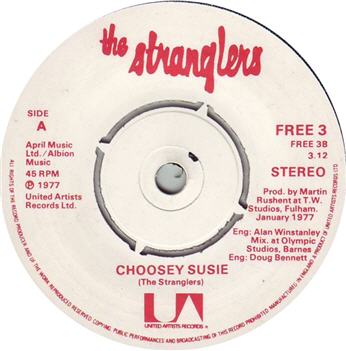
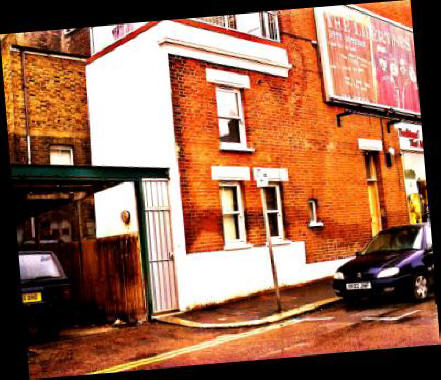
| The freebie single 'Choosie Susie' b/w a live version of 'Peasant In The Big Shitty' which came FREE with the first 10,000 copies of ' Rattus Norvegicus'. |
| The tiny TW Studios in Putney where 'Rattus Norvegicus' was recorded. "TW STUDIOS are tucked away behind a drab shop front off London's Fulham Palace Road. To gain entry you have to go round the side, through a used car lot and down three crumbling steps. The building looks so ramshackle it's difficult to tell whether it's in a state of terminal collapse or whether it's being shored up at the eleventh hour." Chas de Whalley, Sounds, 17 September 1977 |
Rattus Norvegicus track by track by Stranglers bassist
Jean Jaques Burnel:
SOMETIMES
This was one of my bass riffs. The opening line was
about Hugh's inability to control his temper with his
girlfriend at the time, Caroline. If I recall, it was based on
a Doors song 'Love Her Madly' from the LA Woman
album. It's kind of that feel...
GOODBYE TOULOUSE
It was mainly my lyrics, it was Hugh's chords. It was a
6/8, a kind of weird double-waltz time. I wrote the lyrics.
There was a nuclear power plant near Toulouse and, at
the time, we were swapping all our Nostradamus books
around each other. He claimed that there was going to
be an explosion in Toulouse. Then I wove in some
medieval story about some beautiful girl in Toulouse
who was paraded on her balcony. The lyrics were mine.
LONDON LADY
London Lady was a Hugh riff as well with my lyrics. It was
a synthesis of a few ladies that we were meeting at the
time, one of them being Caroline Coon. She was a
journalist for the Melody Maker who was a champion of
the Pistols and the Clash, who'd come on to me at some
point. It wasn't about one particular woman, it was a kind
of synthesis of lots of women.
PRINCESS OF THE STREETS
Princess Of The Streets I wrote entirely. I thought Hugh's
guitar lick on it was brilliant. It was a bluesy thing about
my ongoing relationship with Choosey Susie at the time.
She'd dumped me again, once more!
HANGING AROUND
A lot of people thought that whoever sang the song,
wrote the lyrics, which was not the case, certainly not on
Rattus. I wrote most of the lyrics to Hanging Around, and
the chords. Hugh came up with the actual 'hanging
around' lyric but I did most of the verses. I wrote it when I
was staying with Choosey Susie in Finborough Road in
Earl's Court, when she was doing her nursing training.
Just around the corner, in Brompton Road, was the
Coleherne Pub and on the other side was Boltons. The
Coleherne was more for the leather gays and Boltons
was for the traditional campy ones. Outside the
Coleherne, there was a bus stop and you'd see guys
coming off the bus with motorcyle helmets and leather
jackets. Susie and I walked in there one day to be
confronted by the doors being locked after us by a huge
guy in a leather jacket and leather cap who was blocking
it. There was no turning back! We had half a pint in
there getting stared at. The first time I walked in there,
by accident, I was quite impressed and slightly
intimidated actually.
PEACHES
We had a little 500 watt PA and, just to augment any
income whatsoever, we hired it out for a reggae night
which I think it was in Acton Town Hall. We went there
with Choosey Susie on Saturday afternoon to set it up
alongside another PA which had loads of bass
speakers. I remember distinctly that we were the only
whites there. While we were setting up, the was a whole
group of black guys passing a spliff around. We hung
around them but the spliff got passed by us as if we
were invisible. My over-riding impression, because it was
dub and toasting, where they talk over a bass and
drums rhythm, with a delay on the snare. I remember
going back to Chiddingfold and thinking I'd never heard
bass so dominant before. I thought it was fantastic, it
blew my mind. It was all about space. Lots of bands were
doing lots of notes very fast. Next day I came up with this
riff as I had to do something similar in that vein. Over the
next few weeks, we developed it and Hugh wrote the
lyrics suiting his penchant...
(GET A) GRIP (ON YOURSELF)
Get A Grip On Yourself was entirely Hugh... You can
refer to the 'bible' (Ed: Song By Song) if you want to
know.
UGLY
I think I wrote Ugly entirely, the riff and the lyrics. I
wanted it to sound like a Dr Feelgood thing at the time.
Of course, every time we tried to emulate something, it
ended up being Strangled! We always missed the point.
With Peaches, we missed the point as well. We wanted
to make it a reggae thing but the snare wasn't on the
reggae beat, the third beat. We always got it wrong but
somehow it worked. Ugly was just a rant about money
and poverty and about how the ugliest blokes in the
world, as long as they've got lots of money, always end
up with glamourous women. I don't know how that works!
DOWN IN THE SEWER
Down In The Sewer developed over quite a period of
time. I had the original riff, which was more like a
Beefheart thing. I remember writing that when Choosey
Susie and I went to Normandy for Christmas to visit my
grandparents. I had my bass with me in a really heavy
wooden case that Jet had actually made for me. I took
that with me and came up with the original Sewer bass
riff. I wanted it to be more like a Beefheart thing like
Rockette Morton did. Then we added bits over the
course of about a year. I added the melody. Hugh wrote
the lyrics which were great I thought.
GO BUDDY GO
That's an old story. I wrote it when I was fifteen. It's a
marriage of Hendrix's 'Hey Joe', which was a big hit when
I was fifteen, and the Beach Boys and I stuck them
together. It was about one of those sad little school
dances that we used to got to when you tried actually
making contact with a female and they'd look down their
noses at you!
CHOOSEY SUSIE
Choosey Susie was about my then girlfriend Susie. It's
based on a riff which we've used before 'All Day And All
Of The Night'. It was also nicked from the Kinks by the
Doors for 'Hello I Love You', which they got sued for.
Choosey Susie is the same...
JJ Burnel interviewed on Monday, April 23, 2012
Jean Jaques Burnel:
SOMETIMES
This was one of my bass riffs. The opening line was
about Hugh's inability to control his temper with his
girlfriend at the time, Caroline. If I recall, it was based on
a Doors song 'Love Her Madly' from the LA Woman
album. It's kind of that feel...
GOODBYE TOULOUSE
It was mainly my lyrics, it was Hugh's chords. It was a
6/8, a kind of weird double-waltz time. I wrote the lyrics.
There was a nuclear power plant near Toulouse and, at
the time, we were swapping all our Nostradamus books
around each other. He claimed that there was going to
be an explosion in Toulouse. Then I wove in some
medieval story about some beautiful girl in Toulouse
who was paraded on her balcony. The lyrics were mine.
LONDON LADY
London Lady was a Hugh riff as well with my lyrics. It was
a synthesis of a few ladies that we were meeting at the
time, one of them being Caroline Coon. She was a
journalist for the Melody Maker who was a champion of
the Pistols and the Clash, who'd come on to me at some
point. It wasn't about one particular woman, it was a kind
of synthesis of lots of women.
PRINCESS OF THE STREETS
Princess Of The Streets I wrote entirely. I thought Hugh's
guitar lick on it was brilliant. It was a bluesy thing about
my ongoing relationship with Choosey Susie at the time.
She'd dumped me again, once more!
HANGING AROUND
A lot of people thought that whoever sang the song,
wrote the lyrics, which was not the case, certainly not on
Rattus. I wrote most of the lyrics to Hanging Around, and
the chords. Hugh came up with the actual 'hanging
around' lyric but I did most of the verses. I wrote it when I
was staying with Choosey Susie in Finborough Road in
Earl's Court, when she was doing her nursing training.
Just around the corner, in Brompton Road, was the
Coleherne Pub and on the other side was Boltons. The
Coleherne was more for the leather gays and Boltons
was for the traditional campy ones. Outside the
Coleherne, there was a bus stop and you'd see guys
coming off the bus with motorcyle helmets and leather
jackets. Susie and I walked in there one day to be
confronted by the doors being locked after us by a huge
guy in a leather jacket and leather cap who was blocking
it. There was no turning back! We had half a pint in
there getting stared at. The first time I walked in there,
by accident, I was quite impressed and slightly
intimidated actually.
PEACHES
We had a little 500 watt PA and, just to augment any
income whatsoever, we hired it out for a reggae night
which I think it was in Acton Town Hall. We went there
with Choosey Susie on Saturday afternoon to set it up
alongside another PA which had loads of bass
speakers. I remember distinctly that we were the only
whites there. While we were setting up, the was a whole
group of black guys passing a spliff around. We hung
around them but the spliff got passed by us as if we
were invisible. My over-riding impression, because it was
dub and toasting, where they talk over a bass and
drums rhythm, with a delay on the snare. I remember
going back to Chiddingfold and thinking I'd never heard
bass so dominant before. I thought it was fantastic, it
blew my mind. It was all about space. Lots of bands were
doing lots of notes very fast. Next day I came up with this
riff as I had to do something similar in that vein. Over the
next few weeks, we developed it and Hugh wrote the
lyrics suiting his penchant...
(GET A) GRIP (ON YOURSELF)
Get A Grip On Yourself was entirely Hugh... You can
refer to the 'bible' (Ed: Song By Song) if you want to
know.
UGLY
I think I wrote Ugly entirely, the riff and the lyrics. I
wanted it to sound like a Dr Feelgood thing at the time.
Of course, every time we tried to emulate something, it
ended up being Strangled! We always missed the point.
With Peaches, we missed the point as well. We wanted
to make it a reggae thing but the snare wasn't on the
reggae beat, the third beat. We always got it wrong but
somehow it worked. Ugly was just a rant about money
and poverty and about how the ugliest blokes in the
world, as long as they've got lots of money, always end
up with glamourous women. I don't know how that works!
DOWN IN THE SEWER
Down In The Sewer developed over quite a period of
time. I had the original riff, which was more like a
Beefheart thing. I remember writing that when Choosey
Susie and I went to Normandy for Christmas to visit my
grandparents. I had my bass with me in a really heavy
wooden case that Jet had actually made for me. I took
that with me and came up with the original Sewer bass
riff. I wanted it to be more like a Beefheart thing like
Rockette Morton did. Then we added bits over the
course of about a year. I added the melody. Hugh wrote
the lyrics which were great I thought.
GO BUDDY GO
That's an old story. I wrote it when I was fifteen. It's a
marriage of Hendrix's 'Hey Joe', which was a big hit when
I was fifteen, and the Beach Boys and I stuck them
together. It was about one of those sad little school
dances that we used to got to when you tried actually
making contact with a female and they'd look down their
noses at you!
CHOOSEY SUSIE
Choosey Susie was about my then girlfriend Susie. It's
based on a riff which we've used before 'All Day And All
Of The Night'. It was also nicked from the Kinks by the
Doors for 'Hello I Love You', which they got sued for.
Choosey Susie is the same...
JJ Burnel interviewed on Monday, April 23, 2012
